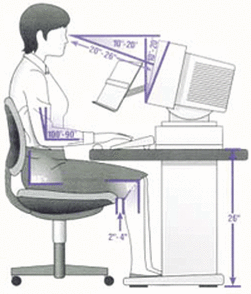
If you are reading this, you probably spend enough time looking at screens (computer, tablet, and/or smartphone) that you need to be aware of the symptoms, risks, and treatments for Computer Vision Syndrome (CVS).
The most common symptoms associated with CVS are:
These problems can all be compounded by vision problems such as farsightedness, astigmatism, poor convergence insufficiency, and aging conditions, such as presbyopia.
While many of the problems resulting from CVS are temporary, their impact on your well being can be significant. CVS frequently causes fatigue which can lead to minor issues such as loss of productivity at work to more major issues like falling asleep at the wheel. Those who experience CVS symptoms over longer periods of time, may find that their existing eye conditions worsen more than they otherwise would have, that CVS symptoms are no longer temporary, and that they begin to the effects of stress - both mental (anxiety, depression, etc.) and physical (neck and back problems).
So, other than abandoning your computer and phone, how do you combat CVS?
The American Optometric Association has a good summary of CVS along with other tips for taking care of eyes.
Age well my friends….
The most common symptoms associated with CVS are:
- Eyestrain
- Headaches
- Blurred vision
- Dry eyes
- Neck and shoulder pain
These problems can all be compounded by vision problems such as farsightedness, astigmatism, poor convergence insufficiency, and aging conditions, such as presbyopia.
While many of the problems resulting from CVS are temporary, their impact on your well being can be significant. CVS frequently causes fatigue which can lead to minor issues such as loss of productivity at work to more major issues like falling asleep at the wheel. Those who experience CVS symptoms over longer periods of time, may find that their existing eye conditions worsen more than they otherwise would have, that CVS symptoms are no longer temporary, and that they begin to the effects of stress - both mental (anxiety, depression, etc.) and physical (neck and back problems).
So, other than abandoning your computer and phone, how do you combat CVS?
- Have your eyes checked regularly and discuss your usage patterns with your eye doctor. If you wear glasses your optometrist might be able to recommend computer friendly lenses; if you don't wear glasses, try these.
- Manage your environment - good lighting, seat position, and distance to screen will all help.
- Take breaks - 20 seconds every 20 minutes and 15 minutes every two hours.
- Eye exercises - both simple ones such as blinking that you can do throughout the day and structured eye workouts will help keep your eyes and brain from atrophying..
The American Optometric Association has a good summary of CVS along with other tips for taking care of eyes.
Age well my friends….




